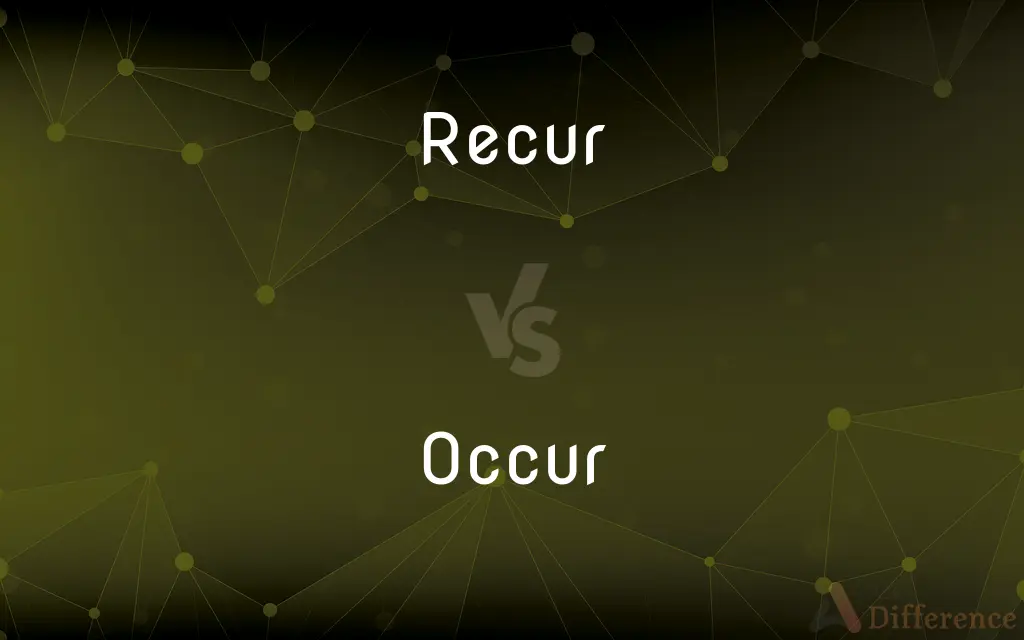Recur vs. Occur — What's the Difference?
By Tayyaba Rehman & Maham Liaqat — Updated on April 22, 2024
"Recur" implies a repeated or periodic occurrence, while "occur" refers to something happening or taking place without implying repetition.

Difference Between Recur and Occur
Table of Contents
ADVERTISEMENT
Key Differences
"Recur" describes an event or situation that happens repeatedly or periodically, such as an annual festival or a recurring headache. Whereas "occur" simply denotes that something happens, without any indication of repetition, like a random event or an accident.
The usage of "recur" is often in contexts where there is an expectation or pattern, such as symptoms that recur in a disease. On the other hand, "occur" can be used for both expected and unexpected events, emphasizing the act of happening itself.
"Recur" can suggest predictability and regularity in the timing of events, which can be critical in fields like medicine or project planning. Whereas "occur" does not convey any information about timing regularity or predictability.
In grammar, "recur" is commonly used with a reference to time (e.g., daily, every year), highlighting the cyclical nature of the event. Conversely, "occur" might be used with a broader range of adverbs, indicating place, time, or manner but without the implication of repetition.
"Recur" often carries a sense of inevitability or a natural rhythm in its occurrences, suitable for natural phenomena or chronic conditions. On the other hand, "occur" is neutral and can refer to both natural and man-made events, irrespective of their frequency or predictability.
ADVERTISEMENT
Comparison Chart
Definition
Happens repeatedly
Happens at least once
Implication
Periodicity
Singularity
Common Contexts
Medical, seasonal events
Accidents, incidents
Adverbial Association
Time (e.g., annually)
Place, time, manner
Predictability
High
Variable
Compare with Definitions
Recur
To appear or occur again in a repeated cycle.
The theme of freedom recurs throughout the book.
Occur
To be met with or found; present itself.
This species occurs in various regions across the continent.
Recur
To return to one's attention or memory.
The same thoughts recur to me every night.
Occur
To take place or happen.
The accident occurred at the intersection.
Recur
Happening again, especially periodically or repeatedly.
The engineers are working to ensure the problem does not recur.
Occur
To come into existence or to be found.
Gold occurs in several geographies around the world.
Recur
To go back in thought or discourse.
He recurred to the subject after a brief digression.
Occur
To present itself or come to mind.
A great idea occurred to her during the meeting.
Recur
To occur again after an interval of time.
The symptoms may recur every few weeks.
Occur
To appear or exist; happen in the course of events.
A delay may occur due to unforeseen circumstances.
Recur
To happen or occur again or repeatedly
The pain recurred after eating.
Occur
To take place; come about.
Recur
To return to one's attention or memory
The thought recurred to her late at night.
Occur
To be found to exist or appear
Copper deposits occur in the region.
Recur
To return in thought or discourse
He recurred to the subject right after dinner.
Occur
To come to mind
The idea never occurred to me.
Recur
(Archaic) To have recourse; resort
"When ... direct taxes are not necessary, they will not be recurred to" (James Madison).
Occur
(intransitive) To happen or take place.
The liftoff will occur in exactly twelve seconds.
Recur
(intransitive) To happen again.
The theme of the prodigal son recurs later in the third act.
Occur
(intransitive) To present or offer itself.
I will write if the opportunity occurs.
Recur
To come to the mind again.
Occur
(impersonal) To come or be presented to the mind; to suggest itself.
Recur
(dated) To speak, write or think about something again; to return or go back (to a subject).
Occur
To be present or found.
The chemical monofluoroacetate occurs in all parts of Dichapetalum cymosum, and is responsible for its toxic effects.
Recur
(obsolete) To go back to using or doing something.
Occur
To meet; to clash.
The resistance of the bodies they occur with.
Recur
(obsolete) To have recourse (to someone or something) for assistance, support etc.; to turn or appeal to (someone or something).
Occur
To go in order to meet; to make reply.
I must occur to one specious objection.
Recur
(obsolete) To go to a location again; to return (to a place).
Occur
To meet one's eye; to be found or met with; to present itself; to appear.
In Scripture, though the word heir occur, yet there is no such thing as "heir" in our author's sense.
Recur
To recurse.
Occur
To happen; to take place; as, I will write if opportunity occurs.
Recur
To come back; to return again or repeatedly; to come again to mind.
When any word has been used to signify an idea, the old idea will recur in the mind when the word is heard.
Occur
To come to the mind; to arise in the mind; to suggest itself; to be presented to the imagination or memory; - of an idea or thought; as, it never occurred to me to call John to ask.
There doth not occur to me any use of this experiment for profit.
Recur
To occur at a stated interval, or according to some regular rule; as, the fever will recur to-night.
Occur
Come to pass;
What is happening?
The meeting took place off without an incidence
Nothing occurred that seemed important
Recur
To resort; to have recourse; to go for help.
If, to avoid succession in eternal existence, they recur to the "punctum stans" of the schools, they will thereby very little help us to a more positive idea of infinite duration.
Occur
Come to one's mind; suggest itself;
It occurred to me that we should hire another secretary
A great idea then came to her
Recur
Happen or occur again;
This is a recurring story
Recur
Return in thought or speech to something
Recur
Have recourse to;
The government resorted to rationing meat
Common Curiosities
What type of verb is "recur"?
"Recur" is an intransitive verb, meaning it does not require a direct object.
Is "occur" appropriate for describing planned events?
Yes, "occur" can be used to describe events that are planned, such as meetings or events.
How is "recur" used in the context of literature or art?
In literature or art, "recur" describes themes, motifs, or images that appear repeatedly throughout a work.
Does "recur" imply a natural or artificial process?
"Recur" can refer to both natural and artificial processes, as long as the event repeats periodically.
Are there any synonyms that can replace "recur" or "occur"?
Synonyms for "recur" include "repeat" and "reappear," while "occur" can be replaced by "happen" or "take place."
Can "occur" imply causality?
"Occur" does not inherently imply causality, but it can be used in contexts where the focus is on the sequence or conditions under which events happen.
What is the difference in connotation between "recur" and "occur"?
"Recur" often carries a connotation of predictability and repetition, whereas "occur" is more neutral, focusing simply on the event of happening.
What are the implications of using "occur" in emergency situations?
In emergency situations, using "occur" helps describe events as they happen, focusing on the immediacy and sometimes unexpected nature of such events.
Can "occur" be used in scientific contexts?
Yes, "occur" is frequently used in scientific contexts to describe phenomena or events that happen.
How does "recur" relate to chronic conditions in medicine?
In medicine, "recur" is often used to describe the return of symptoms or a disease after a period of remission.
Can "occur" be used with specific time expressions?
Yes, "occur" can be used with specific time expressions like "at noon," "on Tuesday," or "during the meeting."
Does "recur" always imply the same intensity or severity in its repetitions?
No, "recur" does not necessarily imply the same intensity or severity; the repetitions can vary in magnitude.
What grammatical constructions commonly accompany "occur"?
"Occur" is often found with constructions like "where," "when," and "as," which set the scene for the event.
Can "recur" be used to describe positive events?
Yes, "recur" can describe positive events like annual celebrations, recurring successes, or favorable conditions that return periodically.
How does the frequency of an event affect the choice between "recur" and "occur"?
The choice between "recur" and "occur" depends on whether the event is seen as part of a predictable pattern (recur) or as a standalone or first-time instance (occur).
Share Your Discovery

Previous Comparison
Collocate vs. Collocation
Next Comparison
Inline vs. OnlineAuthor Spotlight
Written by
Tayyaba RehmanTayyaba Rehman is a distinguished writer, currently serving as a primary contributor to askdifference.com. As a researcher in semantics and etymology, Tayyaba's passion for the complexity of languages and their distinctions has found a perfect home on the platform. Tayyaba delves into the intricacies of language, distinguishing between commonly confused words and phrases, thereby providing clarity for readers worldwide.
Co-written by
Maham Liaqat















































